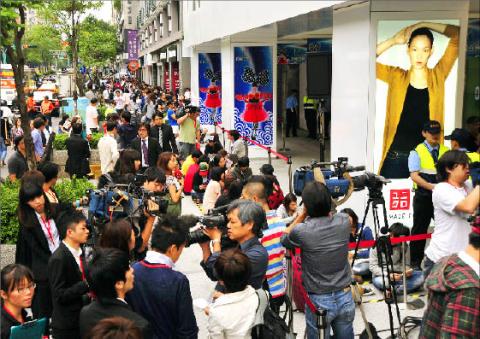Hundreds of people formed a long line along bustling Zhongxiao E Road in Taipei yesterday morning, waiting for the grand opening of Japanese clothes giant Uniqlo’s flagship store in Taiwan.
The Japanese casual wear designer, manufacturer and retailer opened its sixth flagship store in the world in Taipei yesterday.
It is the first of six stores it is planning to launch within two months in Taipei. As of 10am, more than 700 diehard fans of the brand were ready to snap up the clothes once the store opened.

Photo: Pan Shao-tang, Taipei Times
Huang Yu-ting, 24, who happened to have a day off, arrived at about midnight for a place at the head of the line.
Waving her “No. 1” card with a smile, Huang said that her “main target” was a down jacket, adding that her budget for the day was about NT$5,000 to NT$6,000.
Uniqlo’s flagship store occupies the first three floors of the 12-story Ming Yao Department Store (明曜百貨), which also held a grand opening yesterday after seven months of renovation.
Uniqlo’s billionaire founder Tadashi Yanai and Uniqlo Taiwan Ltd chief executive Kousaka Takeshi attended the opening ceremony.
They said they were delighted at the opening and promised to provide top-level service as a way of thanking their customers.
Due to the large crowds at the grand opening of Taiwan’s first Uniqlo store, also in Taipei’s east district, in October last year, the company asked about 500 staff to be on duty yesterday.
When the first Taiwan Uniqlo store opened, 2,500 customers lined up and 7,000 people visited the shop on the first day.
The 3,630m2 flagship store at Ming Yao with 39 fitting rooms and 45 cashier counters is the biggest Uniqlo store in the country,.
Uniqlo casual wear is popular among local young consumers and at present the company has two outlets in Taiwan.
Earlier, Takeshi announced that Uniqlo was launching a plan next year to open 30 outlets each year in Taiwan. The goal is to eventually have 100 outlets around the country.

SETBACK: Apple’s India iPhone push has been disrupted after Foxconn recalled hundreds of Chinese engineers, amid Beijing’s attempts to curb tech transfers Apple Inc assembly partner Hon Hai Precision Industry Co (鴻海精密), also known internationally as Foxconn Technology Group (富士康科技集團), has recalled about 300 Chinese engineers from a factory in India, the latest setback for the iPhone maker’s push to rapidly expand in the country. The extraction of Chinese workers from the factory of Yuzhan Technology (India) Private Ltd, a Hon Hai component unit, in southern Tamil Nadu state, is the second such move in a few months. The company has started flying in Taiwanese engineers to replace staff leaving, people familiar with the matter said, asking not to be named, as the

The prices of gasoline and diesel at domestic fuel stations are to rise NT$0.1 and NT$0.4 per liter this week respectively, after international crude oil prices rose last week, CPC Corp, Taiwan (台灣中油) and Formosa Petrochemical Corp (台塑石化) announced yesterday. Effective today, gasoline prices at CPC and Formosa stations are to rise to NT$27.3, NT$28.8 and NT$30.8 per liter for 92, 95 and 98-octane unleaded gasoline respectively, the companies said in separate statements. The price of premium diesel is to rise to NT$26.2 per liter at CPC stations and NT$26 at Formosa pumps, they said. The announcements came after international crude oil prices

DOLLAR SIGNS: The central bank rejected claims that the NT dollar had appreciated 10 percentage points more than the yen or the won against the greenback The New Taiwan dollar yesterday fell for a sixth day to its weakest level in three months, driven by equity-related outflows and reactions to an economics official’s exchange rate remarks. The NT dollar slid NT$0.197, or 0.65 percent, to close at NT$30.505 per US dollar, central bank data showed. The local currency has depreciated 1.97 percent so far this month, ranking as the weakest performer among Asian currencies. Dealers attributed the retreat to foreign investors wiring capital gains and dividends abroad after taking profit in local shares. They also pointed to reports that Washington might consider taking equity stakes in chipmakers, including Taiwan Semiconductor

A German company is putting used electric vehicle batteries to new use by stacking them into fridge-size units that homes and businesses can use to store their excess solar and wind energy. This week, the company Voltfang — which means “catching volts” — opened its first industrial site in Aachen, Germany, near the Belgian and Dutch borders. With about 100 staff, Voltfang says it is the biggest facility of its kind in Europe in the budding sector of refurbishing lithium-ion batteries. Its CEO David Oudsandji hopes it would help Europe’s biggest economy ween itself off fossil fuels and increasingly rely on climate-friendly renewables. While